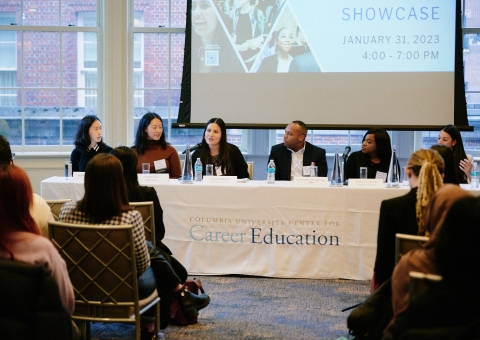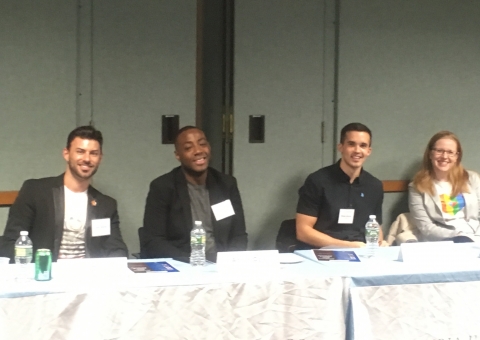As a student or alum whose identities include Lesbian, Gay, Bisexual, Transgender, Non-Binary, Gender Non-Conforming, Genderfluid, or Queer, you may have questions about your job search.
This page offers guidance and resources to help you manage your job search as an LGBTQ+ identifying student. Specifically, it includes:
- Career and Job Search Considerations
- Columbia University LGBTQ+ Community Resources
- Career Resources
- LGBTQ+ Fellowships and Research Opportunities
- Local, National and International Resources
Career and Job Search Considerations
Career Exploration
If you already know what fields you might like to work in you can start to research if they are a good fit for you. Use our industry exploration pages and talk to people in the field. The “explore” section of CCE’s Design Your Next Steps guide contains short assessments to start your career exploration. These activities will help you think about your:
- skills
- interests
- personality traits
- values
- career-related likes/dislikes
College is a time when many individuals explore their gender identity and sexual orientation as well as begin to explore career interests. It is not uncommon for LGBTQ+ students to feel that they have not had the energy, mental space, or opportunities to devote to their career development. In addition to the resources on this page, consider making an appointment to speak with a career counselor for career support or to help you think through options.
Other considerations include the extent to which you would like your career to incorporate your LGBTQ+ identity. Do you want your identity to have a major role, such as working for an LGBTQ+ advocacy group? Or expressed in a smaller way, like joining the LGBTQ+ affinity group for employees at an organization?
Highlighting your strengths
As an individual and a LGBTQ+ identifying student, you can bring unique assets and strengths to your career and the workplace. Make a list of the personal qualities and values you’ve gained from being a member of the LGBTQ+ community. Consider your awareness of how privilege works in the U.S. or in other contexts. Have you overcome challenges or developed nuanced socio-cultural understanding by nature of your identities? LGBTQ+ employees may bring empathy and respect for diversity. You may choose to become an advocate in the workplace (i.e. by joining or starting an LGBTQ+ affinity group). What have you learned from direct involvement in organizations and your life experiences? Keep these in mind as you explore careers, build your resume and cover letters, and prepare for interviews.
Career Planning
We invite you to discuss your career-related concerns, questions and strategies with a CCE career counselor. We’re here to help you get started or to think through the important decisions involved in your job search. Schedule a career counseling appointment or practice interview. We also encourage you to seek out support from the broader Columbia LGBTQ+ community- please see below for more information on resources available to you. Check out all of our Info For pages for resources connected to your identities.
Job Search
As you you are job searching evaluate organizational culture and try to imagine what it would be like to work in a particular location. If you are planning to relocate be sure to research the political climate and cultural attitudes toward LGBTQ+ people as you navigate the job search. Attitudes and protections vary tremendously across the U.S. and Internationally. Talk to people in the organization of you can or ask questions of recruiters.
The Human Rights Campaign has a brief guide to Transitioning in the Workplace, which outlines considerations for applying to jobs while transitioning. A CCE counselor can help you talk through your concerns or develop a plan for what information you want to share; and when and how to navigate these converations with potential employers or your references. Additionally, it is important to inform your references whether or not you are out in your job search, which name and pronouns you will be using in your search, and what information you are comfortable with them disclosing to potential employers. Have this conversation before providing your references’ contact information to employers.
Using Your Preferred Name
What name to use when applying for jobs is a very personal decision. You may wonder whether to use your preferred name or the name on your government-issued ID when submitting a resume and cover letter. There is no right or wrong answer.
Resumes and cover letters are not legal documents. It’s fine to write the name you use even if it does not reflect the name on your government-issued ID. For trans and genderqueer people, doing so may help you to communicate your gender identity with your employer. However, documents used for background checks, social security, tax or insurance paperwork need to have your legal name on them. For resources on how to change your legal name and gender markers, please visit Trans @ Columbia on the Multicultural Affairs website.
Here are a few ways you can address a mismatch between your resume and other legal documents:
- Include your first initial of your legal name, or your full legal name with the name you use in quotes. For example, M. Lydia Robinson or Michael “Lydia” Robinson.
- Use the name on your government-issued ID and disclose your gender identity and name later in the hiring process or after an offer has been made.
- Write the name that you use if you are comfortable coming out early in the hiring process.
Chosing What to Include in a Resume or Cover Letter
Should you include information on your resume or in a cover letter that directly associates you with the LGBTQ+ community? For example, you may wonder whether to include LGBTQ+ specific awards or scholarships, advocacy work, or involvement in LGBTQ+ student organizations. Whether or not to come out on a resume or cover letter depends on your own comfort level and interest in sharing your sexuality or gender identity with others. It is a very personal decision to come out at any stage of the job search process. As such, there is no right or wrong answer.
While it is important to some people to be out and visible, others prefer to be more private. Ask yourself: is it important to you to be out at work? Be sure to research your work environment. Is it likely the organization you’re applying to is LGBTQ+friendly? If you’re concerned they are not, you may choose to highlight the skills you developed but not the organizations you worked with. Is a particular activity, award or experience relevant to the job you are applying for? If the experience does not demonstrate relevant skills you may choose to leave it off at this point.
Sample Resume Excerpt: Including LGBTQ+ community involvement
Columbia Queer Alliance, Columbia University New York, NY
Vice President of Events Fall 2022-Present
- Plan and run movie screenings, panel discussions, LGBTQ+ guest speaker presentations, and other social events by partnering with other queer political activist student groups
- Conduct weekly general body meetings for 20 members
- Created organizational recommendations for high school students on developing sustainable gay-straight alliances
Sample Resume Excerpt: Minimizing visibility of LGBTQ+ community involvement
Below, see the same experience described in ways that focus attention on the role and accomplishments. If there is concern about the organization name, abbreviations are okay. You may also choose to list it as a diversity, community or minority organization without naming it.
Columbia University CQA (a political activist student group) New York, NY
Vice President of Events Fall 2021-Present
- Plan and run movie screenings, panel discussions, guest speaker presentations, and other social events by partnering with other student groups
- Conduct weekly general body meetings for 20 members
- Collaborate with local youth organizations to promote social justice through education.
Selecting Professional Attire
Choosing what to wear to professional meeting, interview or networking event may be particularly challenging for gender expansive, queer and trans job seekers.
The decision to dress according to “traditional”, cisgender norms or to wear clothes that allow you to express your gender identity may vary over time and from interview to interview, depending on your personal comfort level. Your knowledge of the particular employer or industry may inform your decision.
Ideally, wear clothing that makes you feel confident. If you are interviewing or networking in a conservative, corporate environment, you may consciously choose to dress in gender normative attire. For organizations that are more liberal, and particularly those that have shown they are LGBTQ+ inclusive, you may feel comfortable wearing clothes that express who you are. Or you may choose to dress in nonbinary, gender-neutral or androgynous clothing. Like the decision to come out on a resume or in an interview, this is a personal choice and will be impacted by your own level of comfort as well as your research on the particular employer or field.
Sharing Your Identity In An Interview
One way to share your LGBTQ+ identity is to ask questions about affinity groups or employee resources that the employer offers to LGBTQ+ employees. Or, you may bring up your involvement in LGBTQ+ related leadership or advocacy as evidence of skills and knowledge you can bring to the organization. Think about what assets you have as an LGBTQ+ candidate. Are you more empathetic towards others? Do you pick up on subtle nonverbal cues and interpersonal power dynamics? Do you bring a perspective that may be lacking in the organization? These may be strengths you wish to share in an interview.
Employers might ask about your sexuality or gender identity, keep in mind that it is your choice whether to answer the question directly or not.
In some states it is illegal to make a hiring decision based on your answer; in other states it remains legal to discriminate against people because of their LGBTQ+ identity. In New York State, it is illegal for employers to discriminate based on sexual orientation, and in New York City, both sexual orientation and gender identity are protected by state and local laws. (Check with the Human Rights Campaign and New York Attorney General’s office for the latest information).
There are many ways to redirect the conversation or dismiss the question as irrelevant to your employment. For example, if asked about your sexual orientation, you can simply ask if it is relevant to the job you are interviewing for. Conversely, you may choose to bring up your identity/ies to gain a sense of the company’s culture or the employer’s openness.
You can build confidence by preparing to answer the questions you are most nervous about and practicing tactfully negotiating questions around your sexuality. Schedule a mock interview with a career counselor to practice!
Evaluating Employer Culture
Factors to consider when evaluating whether or not you wish to work for a particular employer include:
- work content
- professional skill development
- opportunity for advancement
- work culture
- LGBTQ+ friendly environment
- values alignment
Draw upon your critical observation and analytical skills to understand workplace culture and social dynamics. While it may be difficult to determine if the employer is truly safe and supportive, you can ask about the following indicators for insight into the organizational culture:
- Domestic Partner Benefits including health and life insurance, educational grants, access to facilities, etc.
- Transgender-Inclusive Health Benefits, and insurance coverage for gender affirming care
- Non-discrimination policies that include sexual orientation and gender identity/expression
- Trainings that include sensitivity to LGBTQ+ issues
- Availability of gender-neutral restrooms
- In-house support or employee groups, either formal or informal
- Sponsorship of or participation in LGBTQ+ community activities
- Participation in recruitment events specific to LGBTQ+ candidates
- Equal Opportunity Employer (EOE) statement in job description
- Positive statements from people with experience at the company
The Human Rights Campaign’s Corporate Equality Index is a useful tool for identifying LGBTQ+ inclusive employers. HRC also created the GenEQ Guide to Entering the Workforce to help evaluate employers and understand what to look for in non-discrimination policies and benefits information.
Columbia University LGBTQ+ Community Resources
Multicultural Affairs and LGBTQ @ Columbia
Multicultural Affairs (MA) aims to promote an inclusive university climate by acting as an educational resource that prepares students to succeed in a heterogeneous and ever-changing society. The Office provides a supportive environment for intercultural communication, constructive interaction and mutual understanding. MA aims to strengthen and enhance the richly diverse fabric of the Columbia community by providing and supporting programs and services related to diversity issues. Learn about LGBTQ @ Columbia, which provides advising, advocacy and resources for LGBTQ+ students, and curates the Trans @ Columbia page dedicated to providing up-to-date policies, services, and resources for Columbia’s transgender community.
LGBTQ+ affiliated Student Organizations
LGBTQ+ affiliated student organizations on campus can provide a support network to foster identity development and allow for connections. For a list of Columbia Gender & Sexuality groups, visit the LGBTQ @ Columbia website. Many groups welcome students from all Columbia schools to attend events and become members. Columbia iQ and qSTEM are undergrad and grad groups respectively, focused on the fields of Science, Technology, Engineering, and Mathematics (STEM). An additional group with a pre-professional focus is the Columbia Queer Business Society.
LGBTQ+ affiliated Alumni Community
Columbia Pride’s mission is to build community among Lesbian, Gay, Bisexual, Transgender, Queer, and Questioning (LGBTQ+) alumni of all schools of Columbia University in the City of New York, to foster a safe environment for Columbia’s LGBTQ+ students, to strengthen the LGBTQ+ student community, and to deepen the sense of connection between the LGBTQ+ alumni and student communities, and between these communities and Alma Mater.
Career Resources
The Human Rights Campaign maintains a list of industry specific LGBTQ+ Professional and Student Associations, we’ve highlighted general career resources here.
- LionSHARE: Columbia University Internship/Job board for students and alumni.
- Campus Pride: National LGBTQ+ nonprofit run by college students. Career fairs and job board to connect with LGBTQ+ friendly careers.
- Out For Undergrad: Dedicated to helping high-achieving lesbian, gay, bisexual and transgender undergraduates reach their full potential in their careers. Hosts career conferences in the fields of Business, Marketing, Engineering and Technology.
- Human Rights Campaign: Employee resources on everything from coming out to addressing workplace discrimination as well as the annual Corporate Equiality Index.
- Lesbians Who Tech & Allies: Community of LGBTQ+ women, non-binary and trans individuals in and around tech (and the people who support them).
- Out and Equal Workplace Advocates: Provides information regarding workplace issues and hosts job board and an annual LGBTQ+ workplace summit.
- Out Professionals: Leading LGBTQ+ networking site with a fairly extensive LGBTQ+ centered job bank.
- Out to Innovate: Global community of LGBTQ+ professionals in STEM, provides education, advocacy, professional development, networking, and peer support. Science and Engineering with PRIDE.
- StartOut: LGBTQ+ non-profit for entrepreneurs to drive the economic empowerment of the community.
- Stonewall: UK-based LGBT equality organisation. Offers best practices for LGBT inclusive workplaces and annual list of the 100 best employers for LGBT people in the UK and Europe.
LGBTQ+ Fellowships and Research Opportunities
These are sample fellowships and research opportunities that are available for Columbia students. Be sure to connect with your faculty advisor and the Office of Fellowships to find out additional opportunities.
- Institute for the Study of Sexuality and Gender — Queer Studies Award: honors an undergraduate for excellence in research and writing in Queer Studies.
- FEA Rainbow Scholarship: Fund for Education Abroad provides scholarships and ongoing support to students who are underrepresented among the U.S. study abroad population.
- The Point Foundation LGBTQ+ Scholarships: The Point Flagship Scholarship empowers LGBTQ+ students to access and succeed in their education at accredited four-year institutions in the United States.
- ABF Summer Undergraduate Research Fellowship Program: American Bar Foundation Fellowships introduce undergraduate students from diverse backgrounds to the rewards and demands of a research-oriented career in the field of law and social science.
- Victory Empowerment Fellowship: Victory Empowerment Fellowship is for LGBTQ+ leaders of color and/or transgender leaders who seek to expand their campaign skills and policy-making power.
Local, National and International Resources
NYC Unity Project Guide to LGBTQ+ Community Resources
- NYC Unity Project: This site provides up-to-date information on available LGBTQ+ resources from mental & physical health and wellness to housing and legal services.
Community Centers
- The Lesbian, Gay, Bisexual & Transgender Community Center: Offers advocacy, health & wellness programs; arts, entertainment, cultural events; recovery, parenthood & family support services. TGNC career support and career fairs.
- Destination Tomorrow: Bronx LGBTQ+ Center with community conversation groups providing transgender peer support, listed under Cyber Services on their website.
- Brooklyn Community Pride Center: Pride Path 6 week long internship program provides training and support for LGBTQ+ young adults at the beginning of their careers.
Additional Resources
- Sylvia Rivera Law Project: SRLP works to guarantee that all people are free to self-determine gender identity and expression, regardless of income or race, and without facing harassment, discrimination or violence.
- The National Gay and Lesbian Chamber of Commerce: NGLCC is dedicated to expanding economic opportunities and advancements for LGBTQ+ people.
- Transgender Legal Defense and Education Fund: TLDEF is committed to ending discrimination based upon gender identity and expression and to achieving equality for transgender people through public education, test-case litigation, direct legal services, and public policy efforts.
- International Lesbian, Gay, Bisexual, Trans and Intersex Association: ILGA World is proud to be a global voice of LGBTI networks, communities and movements tirelessly committed to shaping a world where everyone can live safely, equally and free.
Identity and Diversity Abroad from the Office of Global Programs: Columbia’s OGP provides information about studying abroad, including considerations and resources by identity.
Sources:
http://www.hrc.org
https://www.cc-seas.columbia.edu/OMA/CULGBTQ





